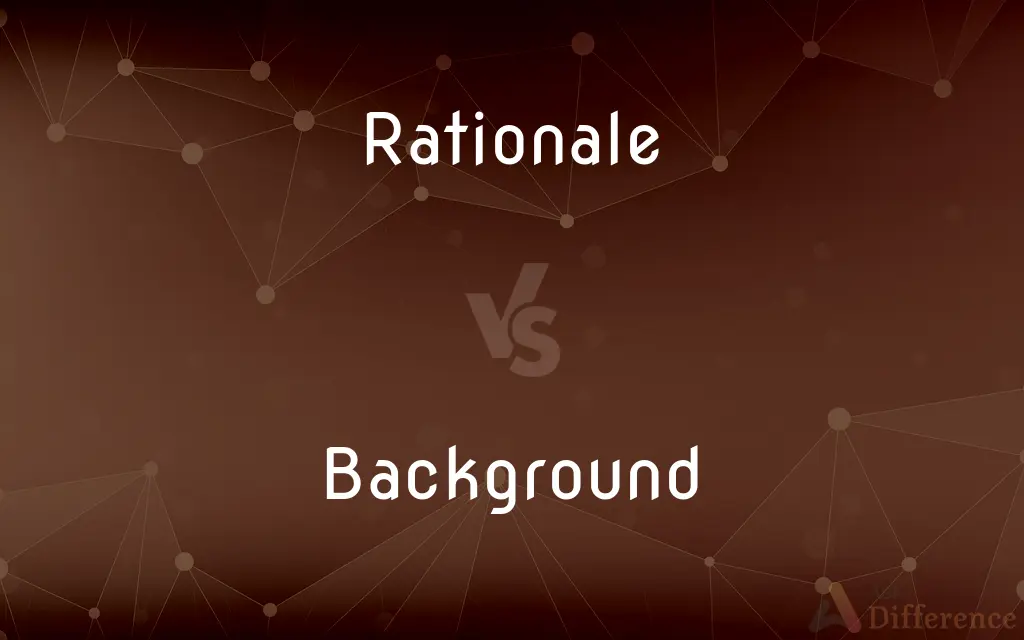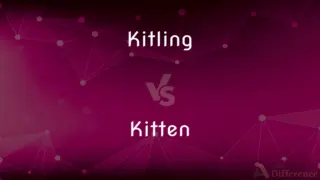Rationale vs. Background — What's the Difference?
By Fiza Rafique & Maham Liaqat — Updated on April 15, 2024
Rationale explains the reasoning behind a decision or action, focusing on justifications; background provides context or history relevant to a situation or topic.

Difference Between Rationale and Background
Table of Contents
ADVERTISEMENT
Key Differences
The rationale of a decision often includes logical reasoning and the objectives aimed to be achieved, detailing why specific actions were chosen. On the other hand, the background sets the scene, describing previous events, circumstances, or historical details that inform the current state or decision-making process.
Rationale is typically forward-looking, concerned with the implications of decisions and their alignment with broader goals or principles. In contrast, background tends to be retrospective, offering a foundation of knowledge that explains how things came to be.
In writing or speech, providing a rationale means articulating the thought process that leads to a particular conclusion or action. Whereas providing background means delivering essential information that aids in understanding the premises or factors leading up to the situation being discussed.
Rationale is crucial in persuasive contexts, such as proposals or arguments, where the aim is to convince others of the soundness of a decision. Background information, however, is vital for narrative or explanatory purposes, ensuring that the audience has the necessary context to fully understand or evaluate the matter at hand.
When preparing a scientific paper or business case, the rationale section highlights the importance and expected outcomes of the research or project, focusing on justification. Conversely, the background section would cover existing research, market analysis, or historical data pertinent to the subject.
ADVERTISEMENT
Comparison Chart
Focus
Reasons behind choices and actions
Historical context and preceding information
Purpose
To justify and explain decisions
To inform and provide context
Temporal Orientation
Future-oriented (implications and objectives)
Past-oriented (events and conditions)
Usage in Discourse
Persuasive and explanatory
Informative and explanatory
Key Elements
Logical reasoning, objectives, justification
Historical details, foundational data
Compare with Definitions
Rationale
The underlying reason in support of something, often explained in detail.
His rationale for choosing the location was its proximity to key resources.
Background
Pre-existing conditions or settings that influence current scenarios.
Understanding the background of the community helps in planning effective public services.
Rationale
Grounds for a belief or action seen in arguments or reasoning.
The scientific rationale behind the study was clearly defined in the methodology.
Background
Information provided about previous events or circumstances relevant to a situation.
The background of the conflict has roots in decades of political tension.
Rationale
Explanation that is coherent and logically structured.
She presented a compelling rationale for the new educational framework.
Background
Detailed description of a person’s or entity’s history or past experiences.
The background check revealed his extensive expertise in cybersecurity.
Rationale
A systematic set of arguments that lead to a conclusion.
The policy’s rationale was thoroughly outlined in the opening statements.
Background
A setting or situation’s historical or cultural context.
He gave a detailed background of the law to better understand its implications.
Rationale
Justification of an action or decision based on reasoning or principles.
The rationale for the merger was based on market expansion and cost reduction.
Background
Foundation or basis of an argument, provided to clarify details.
Her presentation included a background on economic theories relevant to her topic.
Rationale
The fundamental reasons for something; the basis
The rationale for dropping the atomic bomb.
Background
The part of a picture, scene, or design that forms a setting for the main figures or objects, or appears furthest from the viewer
The word is written in white on a red background
The house stands against a background of sheltering trees
Rationale
An explanation of the basis or fundamental reasons for something.en
Background
The circumstances or situation prevailing at a particular time or underlying a particular event
The political and economic background
Background information
Rationale
A justification or rationalization for something.
Background
Form a background to
Windswept land backgrounded by the Rockies
Rationale
A liturgical vestment worn by some Christian bishops of various denominations.
Background
Provide with background
The embassy backgrounded American reporters
Rationale
An explanation or exposition of the principles of some opinion, action, hypothesis, phenomenon, or the like; also, the principles themselves.
Background
The ground or scenery located behind something.
Rationale
(law) an explanation of the fundamental reasons (especially an explanation of the working of some device in terms of laws of nature);
The rationale for capital punishment
The principles of internal-combustion engines
Background
The part of a pictorial representation that appears to be in the distance and that provides relief for the principal objects in the foreground.
Background
The general scene or surface against which designs, patterns, or figures are represented or viewed.
Background
A position, area, or situation that is not immediately in one's attention or notice
You can hear traffic moving in the background during the interview.
Background
(Computers) The environment in which programs operate that the user does not engage with directly
Processes that run in the background.
Background
The circumstances and events surrounding or leading up to an event or occurrence.
Background
A person's experience, training, and education
Her background in the arts is impressive.
Background
The cultural or social environment in which a person was brought up or has lived
A class with students from many different backgrounds.
Background
Subdued music played especially as an accompaniment to dialogue in a dramatic performance.
Background
Sound that intrudes on or interferes with an audio recording.
Background
Low-level radiation, as from radioactive decay, that exists as part of the natural environment.
Background
Less important or less noticeable in a scene or system.
Background noise
The antivirus program runs on a background thread.
Background
One's social heritage, or previous life; what one did in the past.
The lawyer had a background in computer science.
Background
A part of the picture that depicts scenery to the rear or behind the main subject; context.
Background
Information relevant to the current situation about past events; history.
Background
A less important feature of scenery (as opposed to foreground).
There was tons of noise in the background.
The photographer let us pick a background for the portrait.
Background
(computing) The image or color over which a computer's desktop items are shown (e.g. icons or application windows).
Background
(computing) A type of activity on a computer that is not normally visible to the user.
The antivirus program is running in the background.
Background
(physics) background radiation
Background
To put in a position that is not prominent.
Background
(journalism) To gather and provide background information (on).
Background
Ground in the rear or behind, or in the distance, as opposed to the foreground, or the ground in front.
Background
The space which is behind and subordinate to a portrait or group of figures.
Background
Anything behind, serving as a foil; as, the statue had a background of red hangings.
Background
A place in obscurity or retirement, or out of sight.
I fancy there was a background of grinding and waiting before Miss Torry could produce this highly finished . . . performance.
A husband somewhere in the background.
Background
The set of conditions within which an action takes place, including the social and physical conditions as well as the psychological states of the participants; as, within the background of the massive budget deficits of the 1980's, new spending programs had little chance of passage by the congress.
Background
The set of conditions that precede and affect an action, such as the social and historical precedents for the event, as well as the general background{5}; as, against the background of their expulsion by the Serbs, the desire of Kosovars for vengeance is understandable though regrettable.
Background
The signals that may be detected by a measurement which are not due to the phenomenon being studied, and tend to make the measurement uncertain to a greater or lesser degree.
Background
An agreement between a journalist and an interviewee that the name of the interviewee will not be quoted in any publication, although the substance of the remarks may be reported; - often used in the phrase "on background". Compare deep background.
Background
A person's social heritage: previous experience or training;
He is a lawyer with a sports background
Background
The part of a scene (or picture) that lies behind objects in the foreground;
He posed her against a background of rolling hills
Background
Information that is essential to understanding a situation or problem;
The embassy filled him in on the background of the incident
Background
Extraneous signals that can be confused with the phenomenon to be observed or measured;
They got a bad connection and could hardly hear one another over the background signals
Background
Relatively unimportant or inconspicuous accompanying situation;
When the rain came he could hear the sound of thunder in the background
Background
The state of the environment in which a situation exists;
You can't do that in a university setting
Background
(computer science) the area of the screen in graphical user interfaces against which icons and windows appear
Background
Scenery hung at back of stage
Background
Understate the importance or quality of;
He played down his royal ancestry
Common Curiosities
What is the primary purpose of a rationale?
To justify and explain decisions or actions, focusing on reasoning and objectives.
Can rationale and background overlap in their use?
Yes, both can be used to support an argument or explanation, though they focus on different aspects (justification vs. context).
What is the importance of background in research?
It offers necessary context about prior research, theories, and findings that frame the current investigation.
In what types of documents is a rationale typically required?
Research papers, project proposals, business cases, and persuasive essays.
How does one effectively present a rationale in writing?
By clearly articulating the reasoning, objectives, and expected outcomes of the decisions or actions.
What distinguishes a rationale from a hypothesis?
A rationale provides reasons for actions, while a hypothesis is a testable prediction made prior to research.
How does background information support understanding?
By providing historical or contextual details that aid in comprehending the current state or decisions.
What should be included in the background section of a report?
Relevant historical data, previous research, and any pertinent details that establish the framework for current analysis.
Why is background essential in storytelling?
It provides depth and context, allowing the audience to connect more deeply with the narrative.
How does rationale support change management?
By explaining the reasons for change, it helps gain stakeholder buy-in and support.
Is rationale more subjective than background?
Rationale can be more subjective, as it often includes personal or organizational perspectives on why decisions are made.
Can background influence the development of a rationale?
Yes, understanding the background can directly influence the formation and articulation of a rationale.
How should rationale be structured for clarity?
It should be coherent, logically sequenced, and directly connected to the goals or outcomes discussed.
In what ways can background details enrich academic writing?
By grounding the research in a broader scholarly conversation and providing a baseline for new insights.
Does background need to be comprehensive in all reports?
The depth of background required varies depending on the audience’s existing knowledge and the complexity of the topic.
Share Your Discovery

Previous Comparison
Manner vs. Style
Next Comparison
Kitling vs. KittenAuthor Spotlight
Written by
Fiza RafiqueFiza Rafique is a skilled content writer at AskDifference.com, where she meticulously refines and enhances written pieces. Drawing from her vast editorial expertise, Fiza ensures clarity, accuracy, and precision in every article. Passionate about language, she continually seeks to elevate the quality of content for readers worldwide.
Co-written by
Maham Liaqat














































